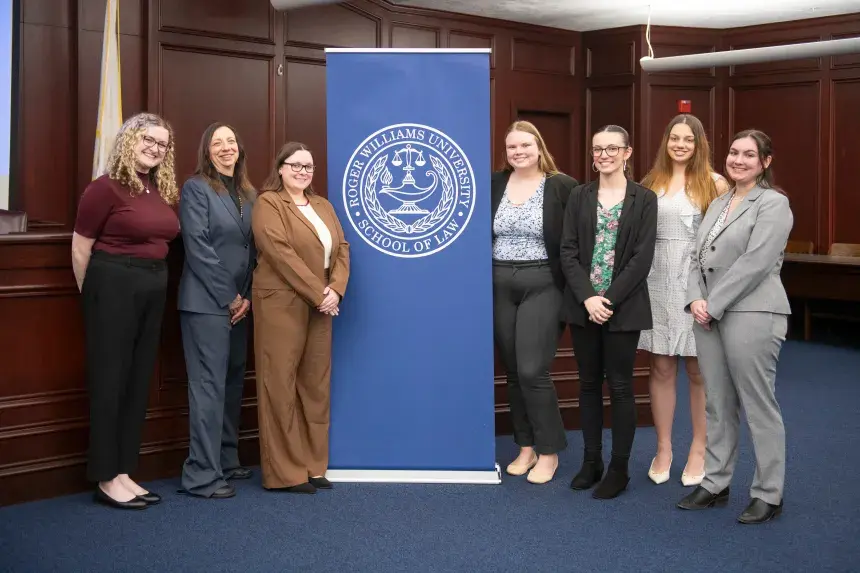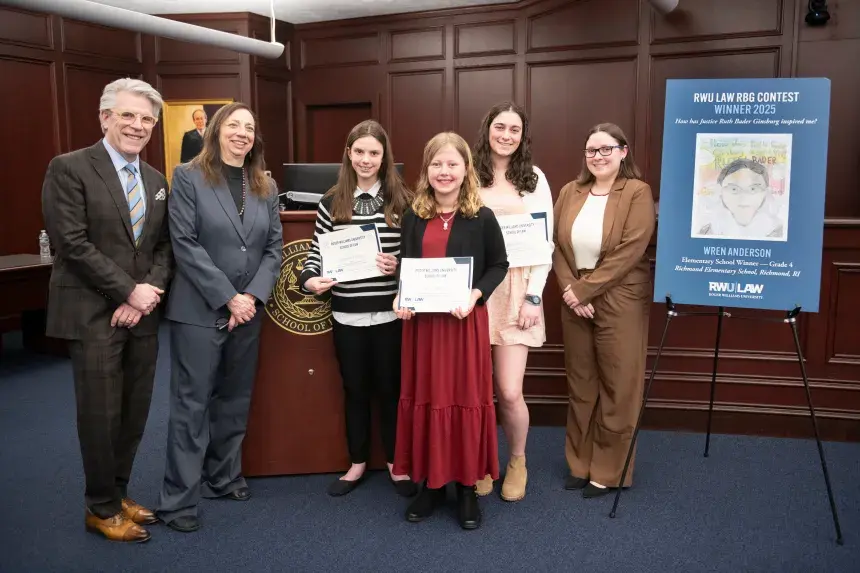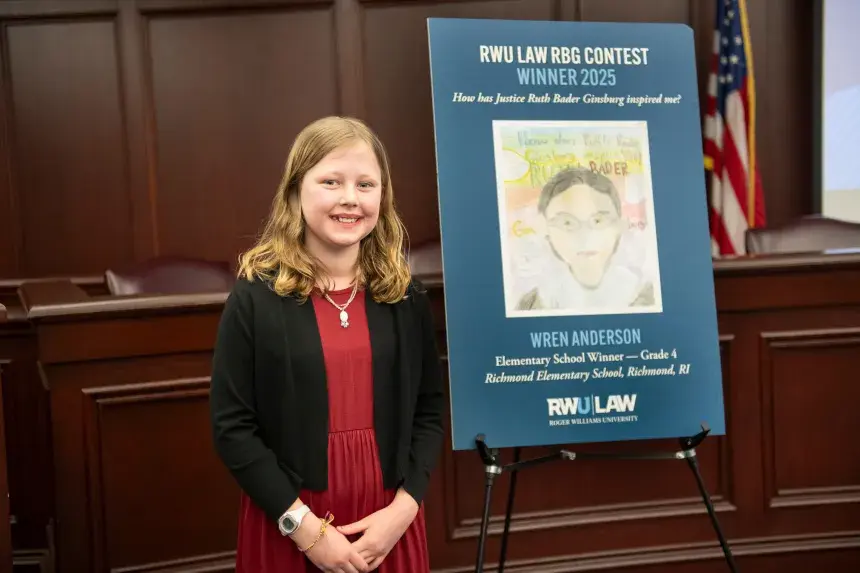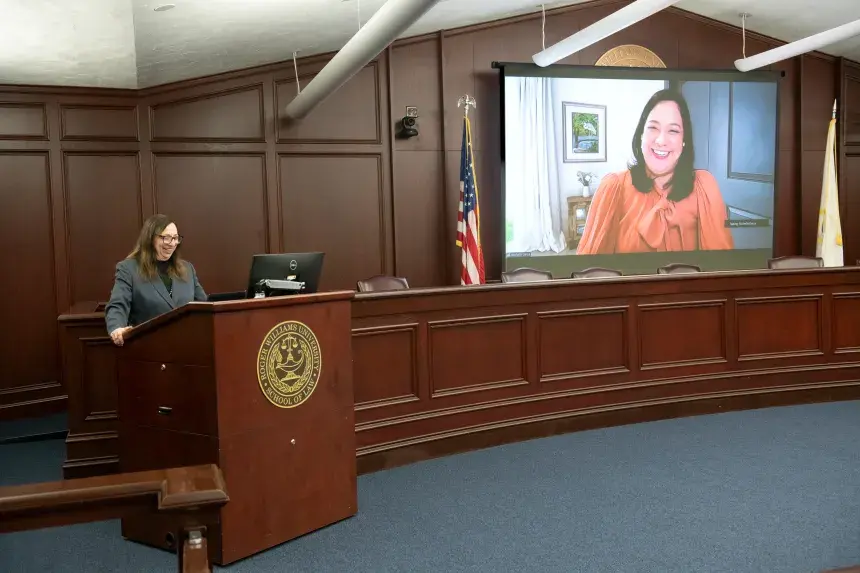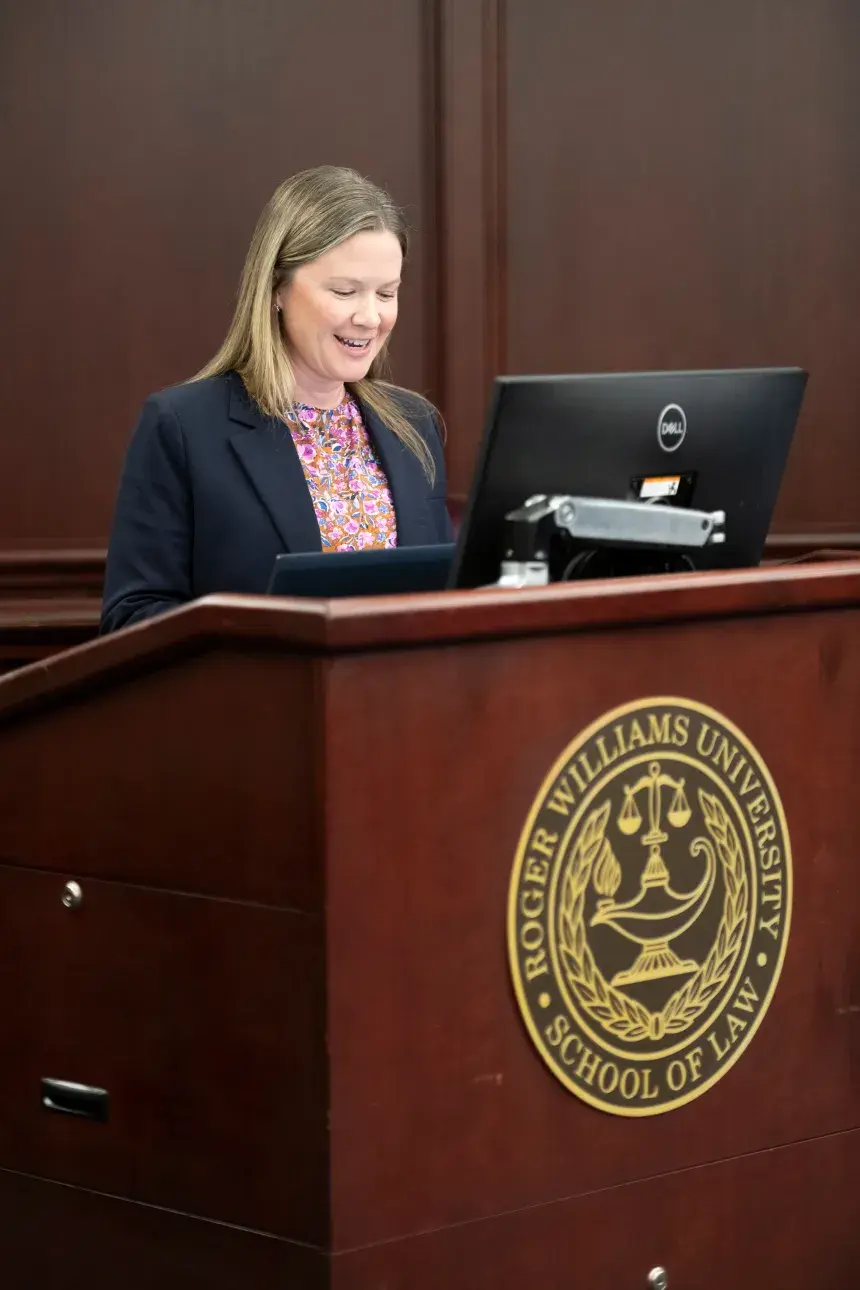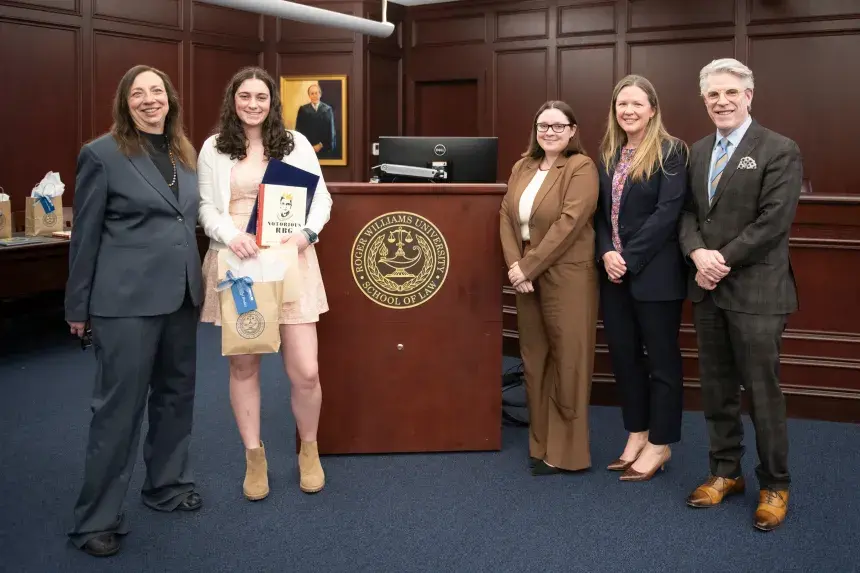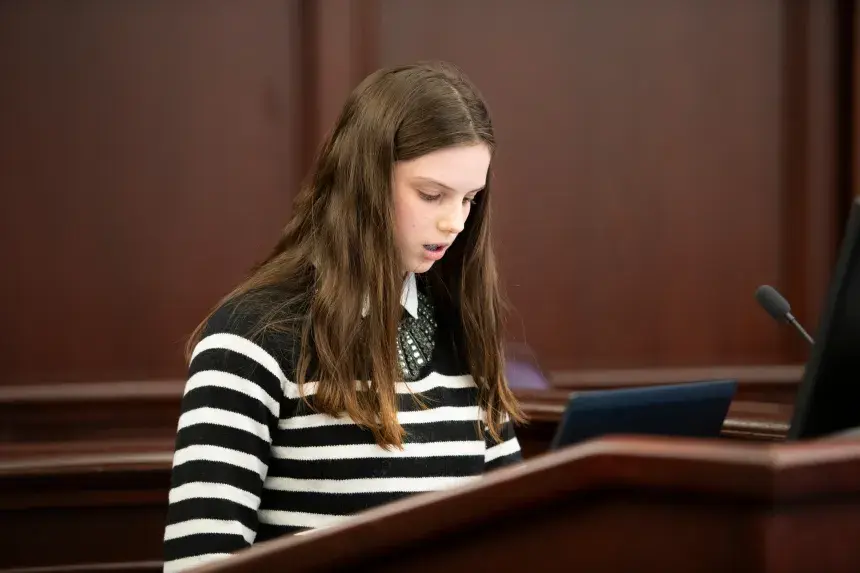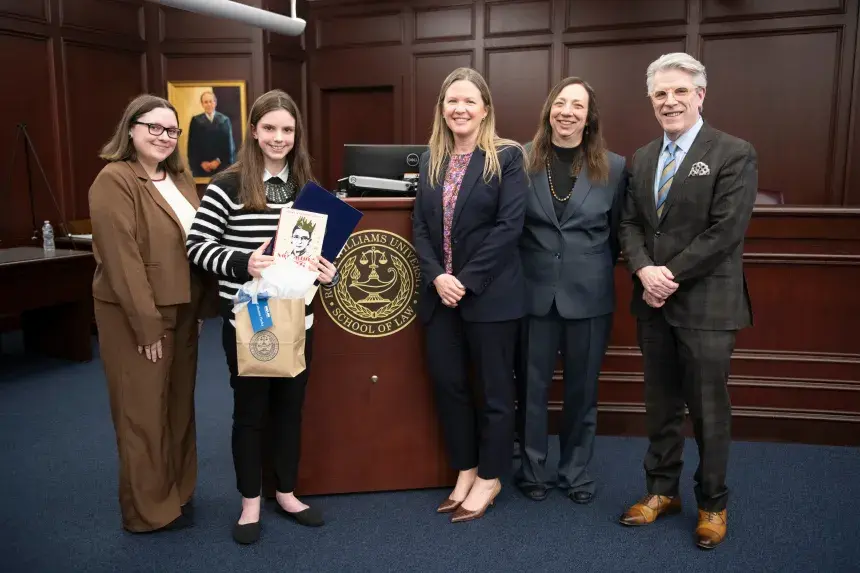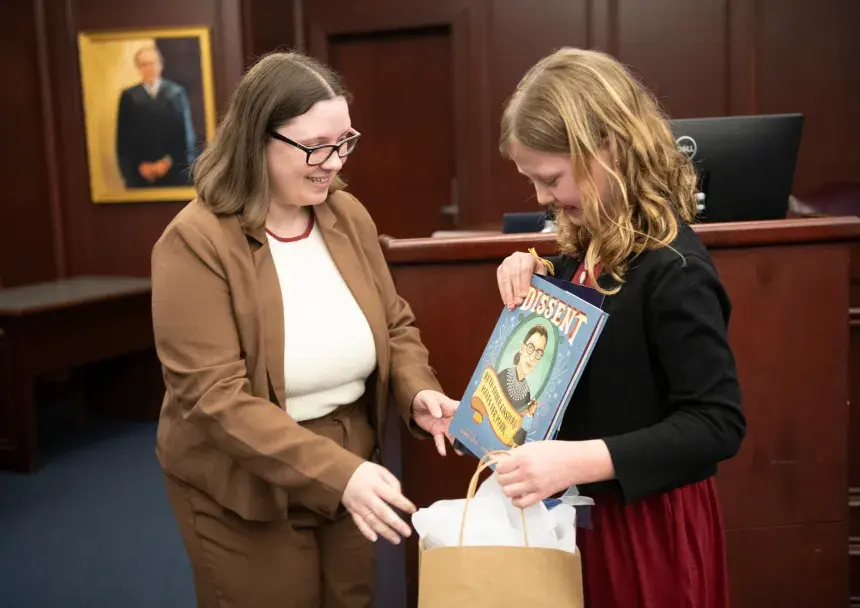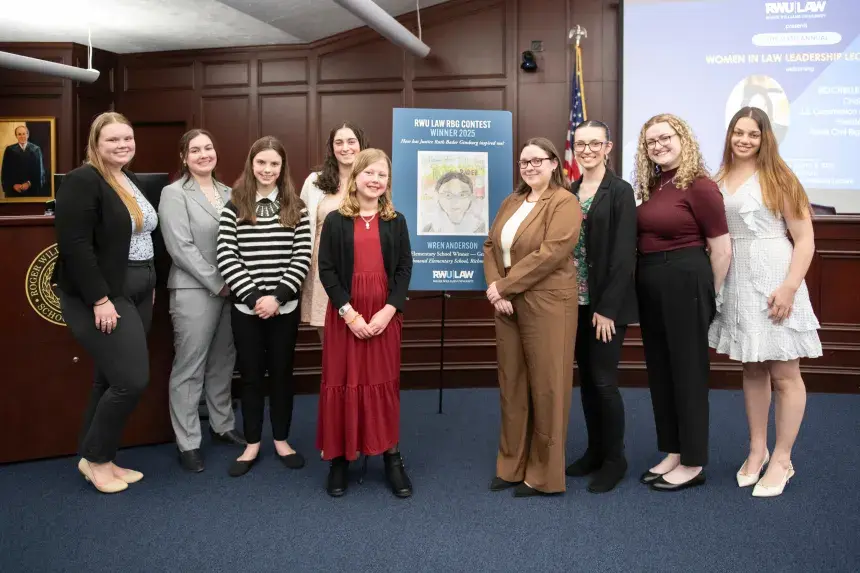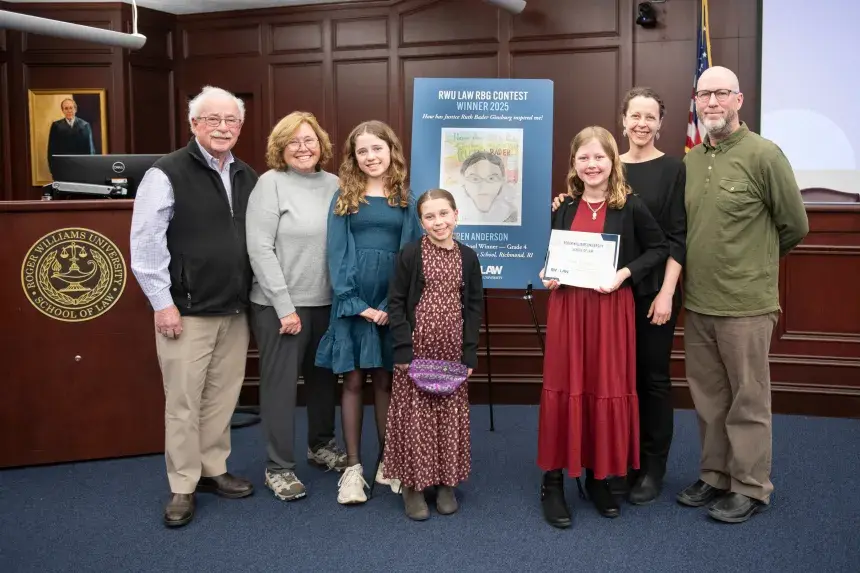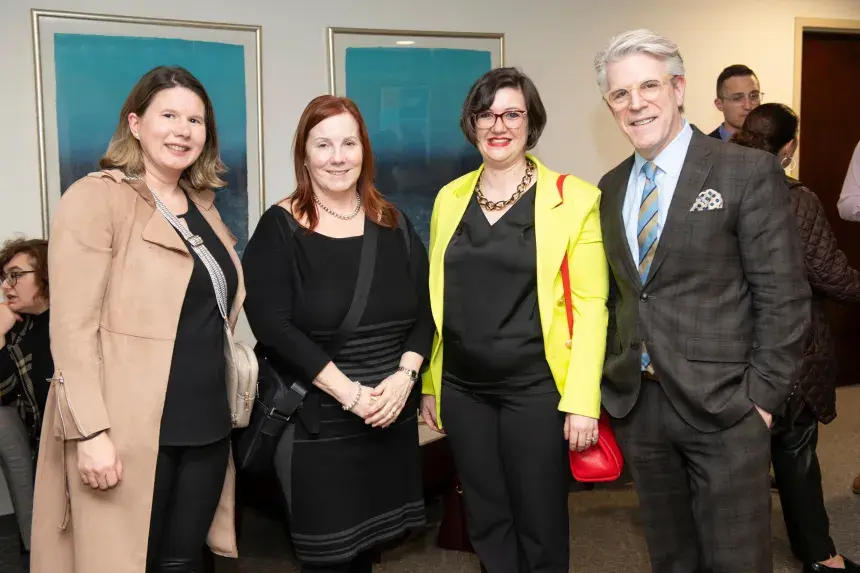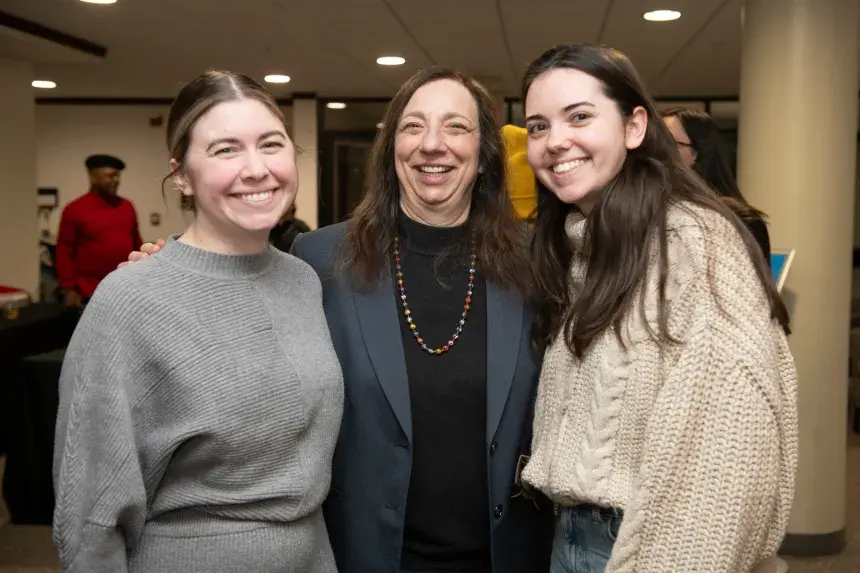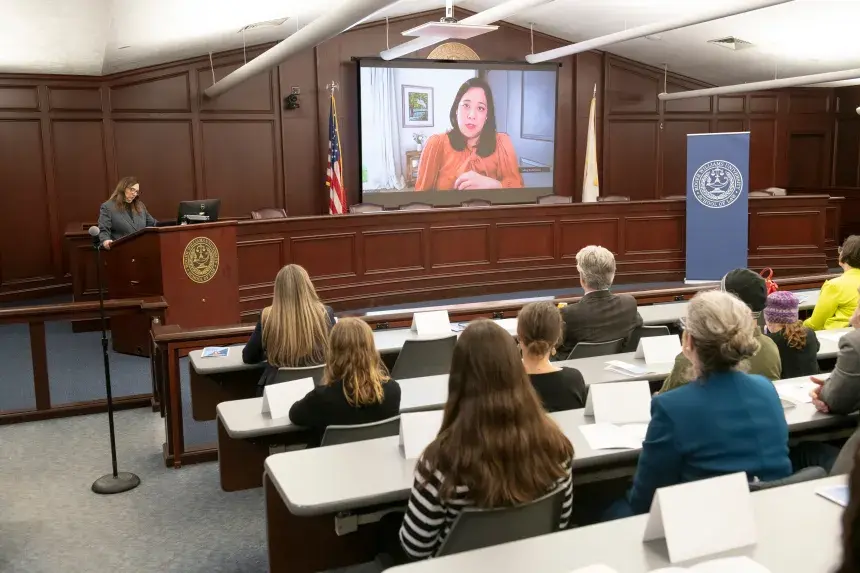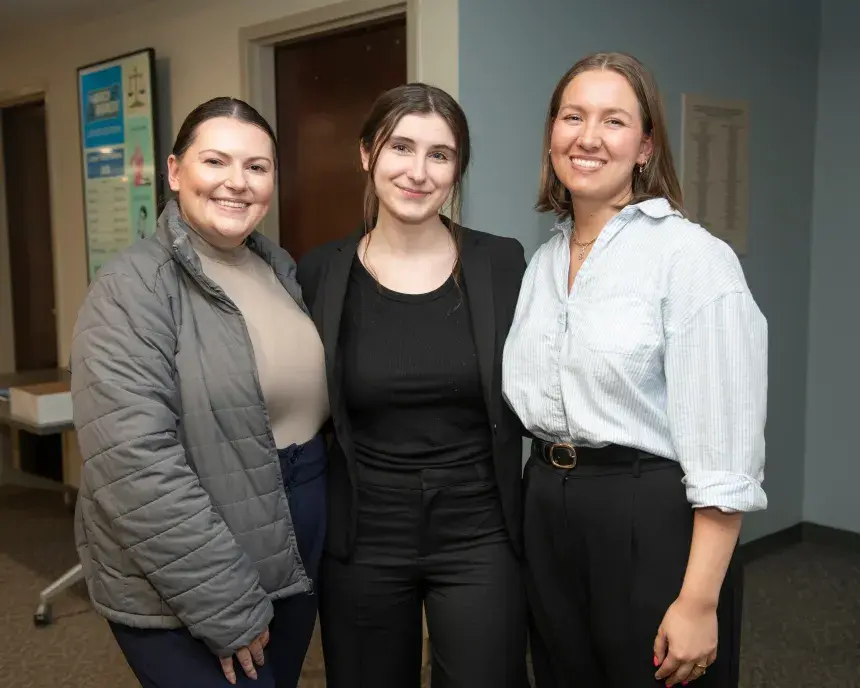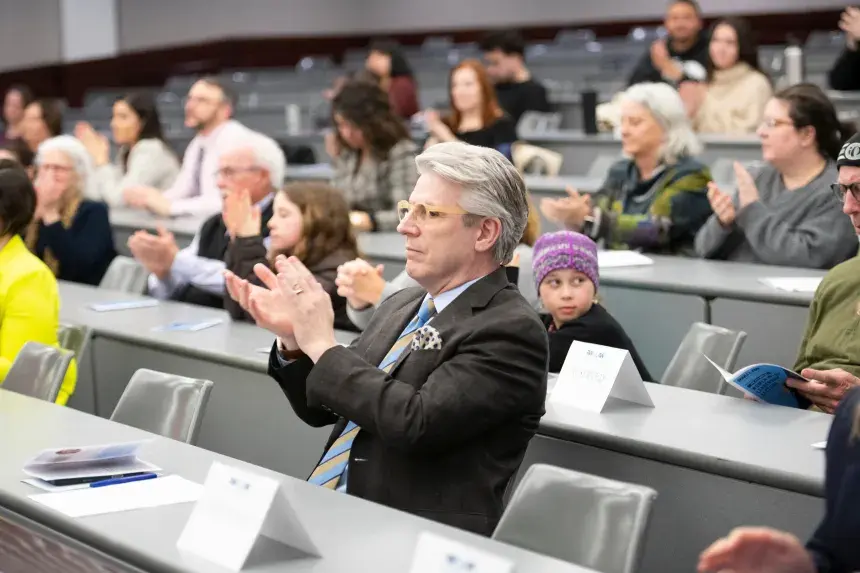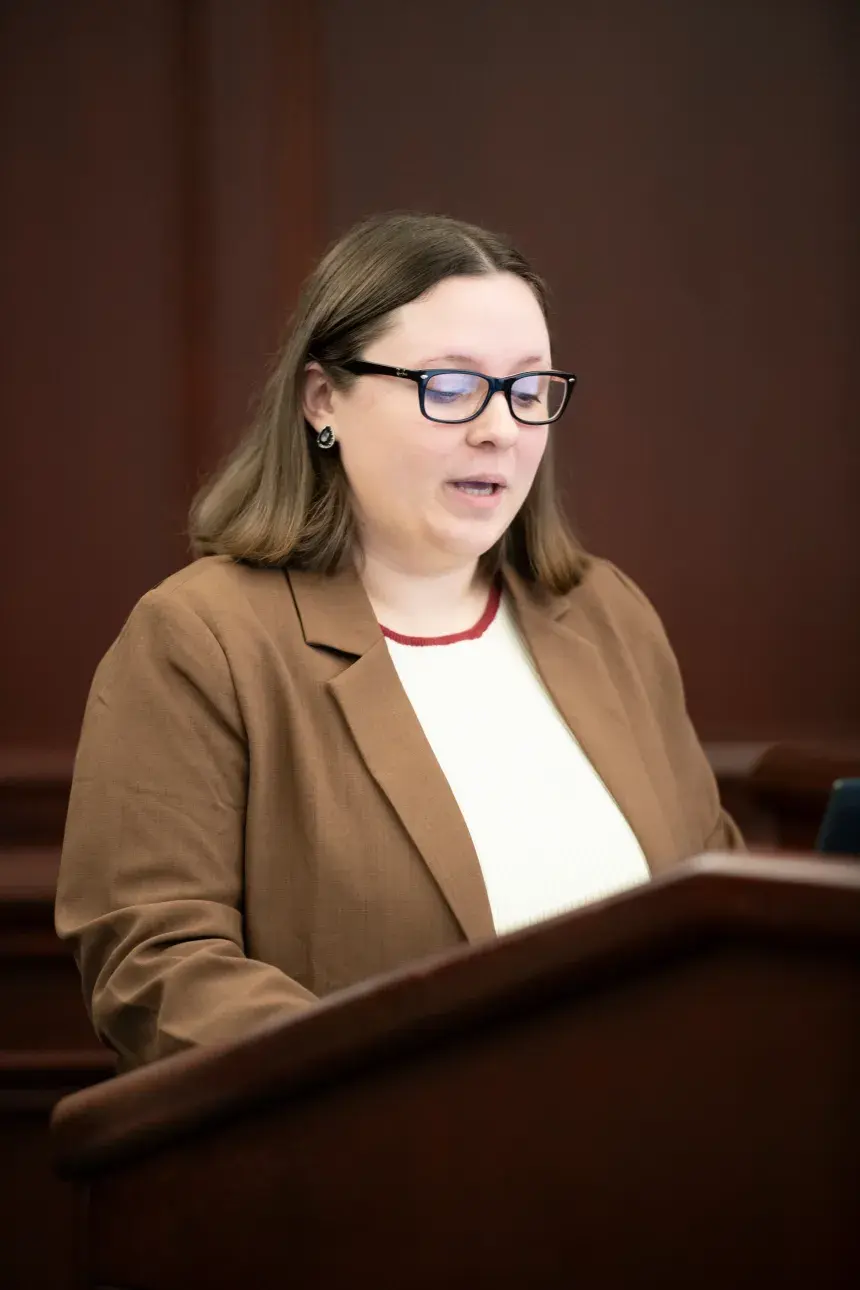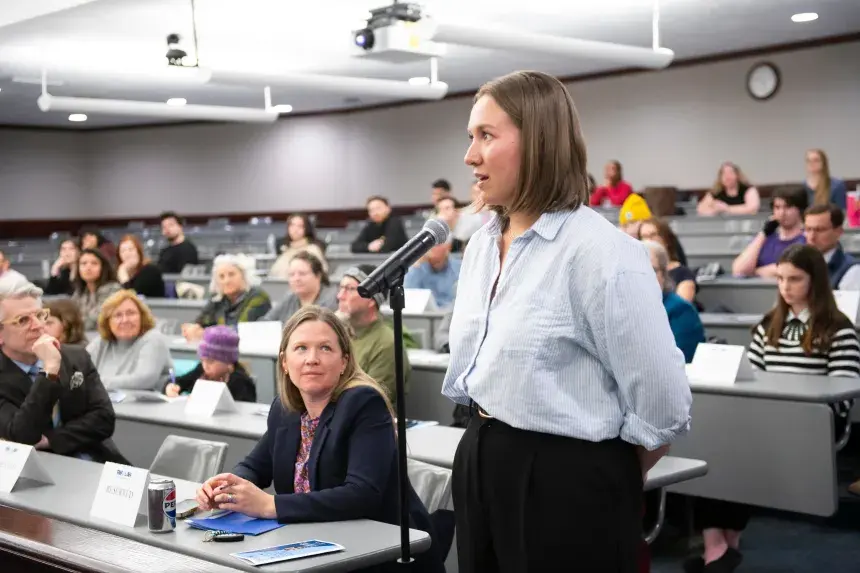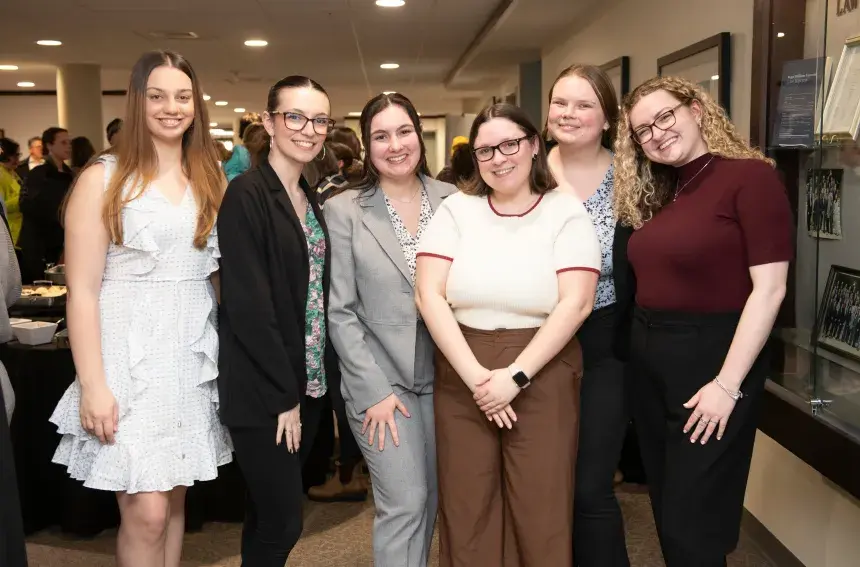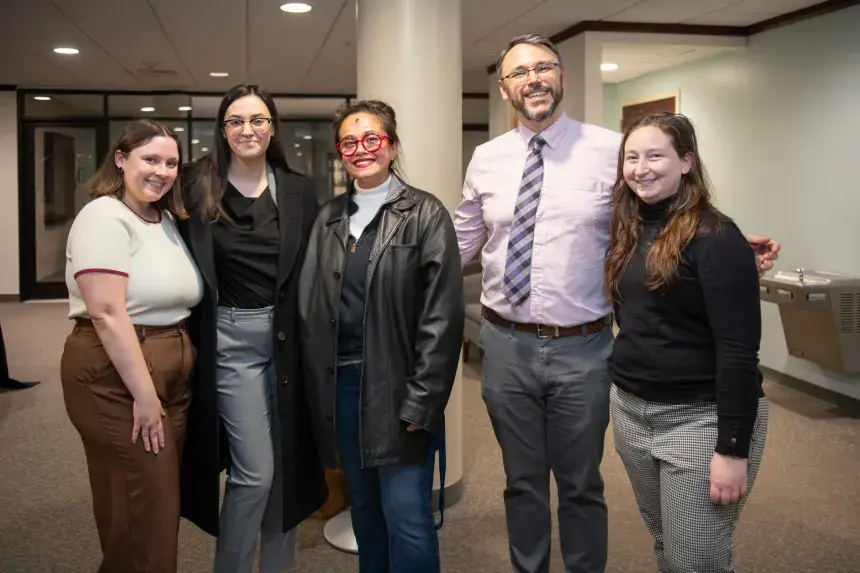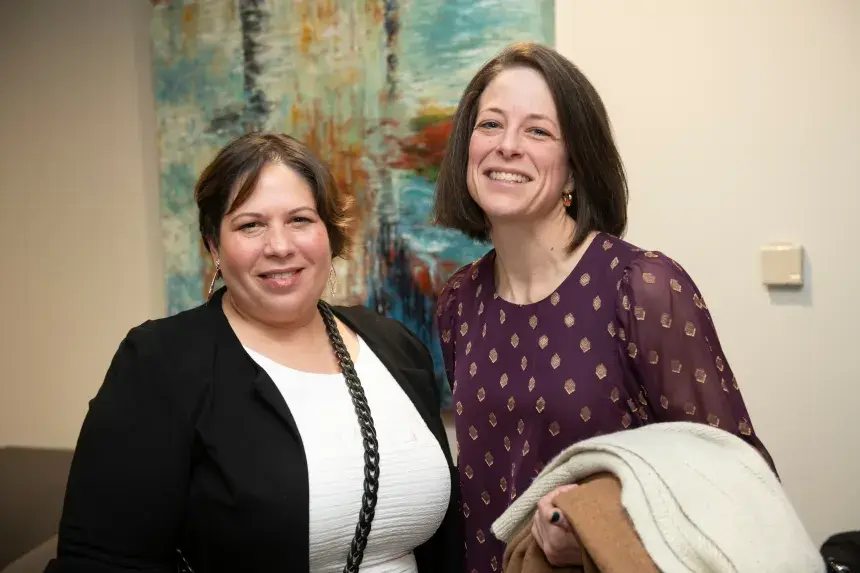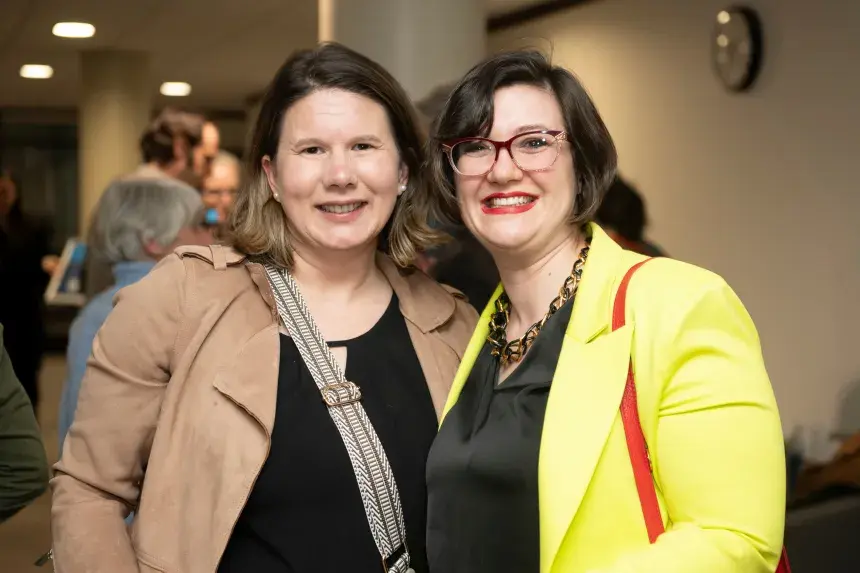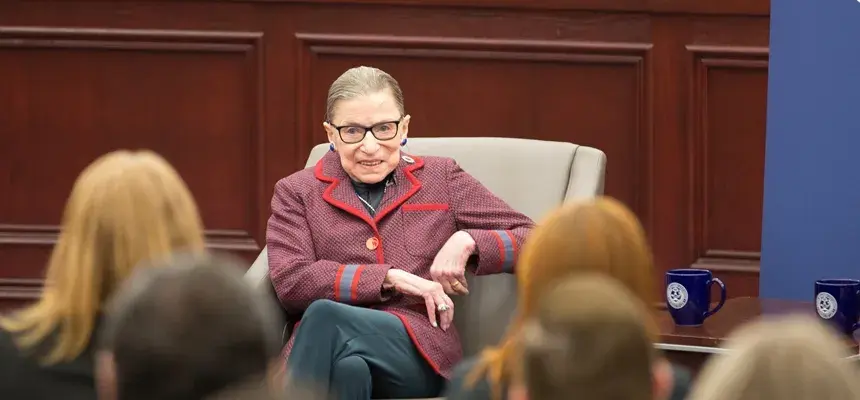
Ruth Bader Ginsburg Essay/Art Contest
Rhode Island elementary, middle and high School students are invited to submit drawings, essays on how iconic U.S. Supreme Court Justice Ruth Bader Ginsburg has inspired them.
Each year, Roger Williams University School of Law, Rhode Island’s only law school, invites Ocean State students from grades K through 12 to submit essays and drawings on how they have been inspired by the legacy of late Associate Justice Ruth Bader Ginsburg of the Supreme Court of the United States, who passed away on September 18, 2020.
“Justice Ginsburg cared about equality for all people,” noted RWU Law Professor Emily Sack, who advises the school’s Women’s Law Society. “When she started her fight for women’s equality under the law, it seemed like an impossible task, but she worked hard and persisted, and made great strides for the things she believed in.
“She also knew that this is not something she could accomplish alone, and that we all have a part to play in making a better world,” Sack added. “She famously said, ‘Fight for things you care about, but do it in a way that will lead others to join you.’ At RWU Law, we thought this essay contest would be a wonderful way for all of us, and especially our state’s students, to be inspired by Justice Ginsburg’s life and her call to action.”
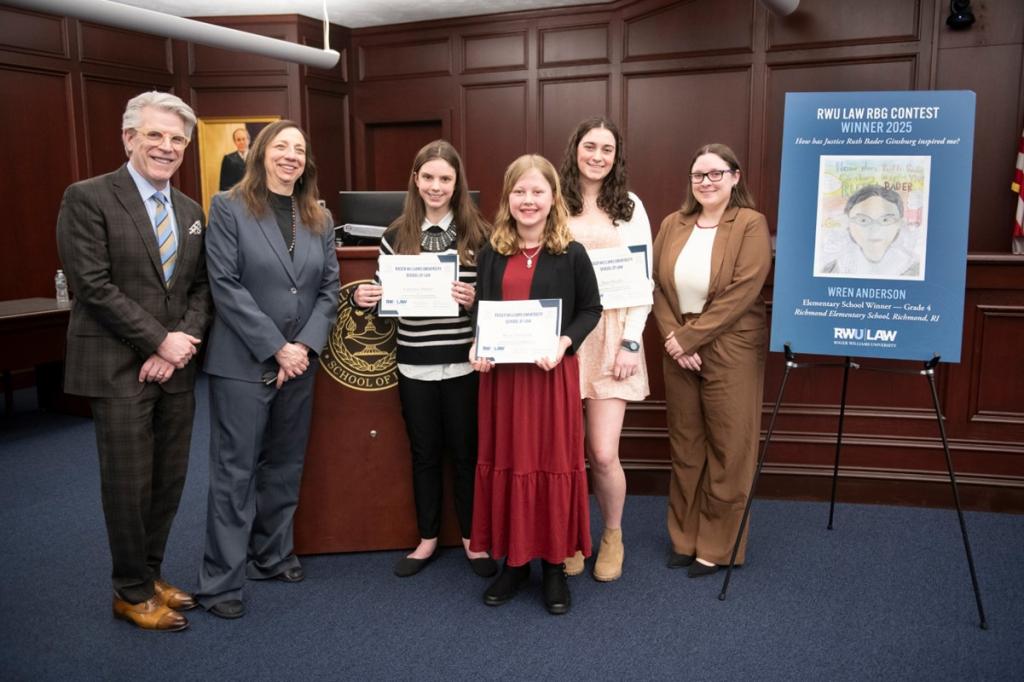
(L to R) Gregory W. Bowman, RWU Law Dean; Emily J. Sack, RWU Law Professor; Middle School Category - Catherine Harley - Broad Rock Middle School, Grade 7; Elementary School Category - Wren Anderson - Richmond Elementary School, Grade 4; High School Category - Hazel Bradley - Mt. Hope High School, Grade 10; Megan Graham L’25, RWU Law Women’s Law Society President.
Women in Law Leadership Lecture 2025
CATEGORIES
Elementary School (Grades K-5)
- Create an original piece of artwork that symbolizes How has RBG inspired me? Artwork may not be traced or copied. Only original works will be accepted. No clipart.
- Give your artwork a title. Place title at the top of your page.
- Use materials that you have. i.e., pencil, crayons, watercolor, and markers.
- Paper size: 8 ½ x 11”.
- Artwork submissions may be photographed or scanned and then uploaded. JPEG format preferred. Use submission link on this page.
Middle School (Grades 6-8)
- Create an original essay on How has RBG inspired me?
- The essay title should be at the top of page one.
- Limited to one page, double spaced (about 250 words)
High School (Grades 9-12)
- Create an original essay on How has RBG inspired me?
- The essay title should be at the top of page one.
- Limited to two pages, double spaced (about 500 words)
Instructions for All Categories:
- The essay/artwork title should be at the top of page one.
- Submissions may be uploaded and submitted via the link on this page. Artwork may be scanned.
- Mailed entries will not be considered.
- Submissions must include student’s name, grade, school, title of artwork or essay, and parent or guardian name & contact information.
- Single Student Submissions only. Artwork and essays submitted are single student submission, no group submissions.
Prizes:
One winning submission will be selected from each category.
- Elementary School (Grades K-5): $100 and one copy of I Dissent: Ruth Bader Ginsburg Makes Her Mark by Debbie Levy
- Middle School (Grades 6-8): $200 and one copy of Notorious RBG Young Readers' Edition: The Life and Times of Ruth Bader Ginsburg by Irin Carmon & Shana Knizhnik
- High School (Grades 9-12): $300 and one copy of Notorious RBG: The Life and Times of Ruth Bader Ginsburg by Irin Carmon & Shana Knizhnik
All winning submissions will be featured on the Roger Williams University School of Law website and announced at the annual Women in Law Leadership Lecture to be held in the Spring of 2026. Winning submissions will need to present a W-9 to claim their prizes. Winners consent to submit a quality photograph of themselves to be used in print and social media.
Eligibility:
Students* in grades K-12 and attending school in Rhode Island are eligible to participate. The contest is open to private, public, and home-schooled students. Middle School participants in Grade 5 may select to submit in the Middle School (Grade 6-8) Category and submit an essay. Judges will conduct reviews by category.
*Students who are the children of current Roger Williams University and Roger Williams University School of Law employees or students are ineligible to participate.
Judging:
Judging will be conducted by members of the Women’s Law Society of Roger Williams University School of Law. Entries will be reviewed by grade level.
Deadline Extended:
Monday, February 9, 2026 by 5:00 PM EST.
Teacher Resources:
Questions may be directed to RBGessay@rwu.edu
Elementary School Winner (Grades K-5)
"How has Justice Ruth Bader Ginsburg inspired me?"
Wren Anderson, Richmond Elementary School, Grade 4
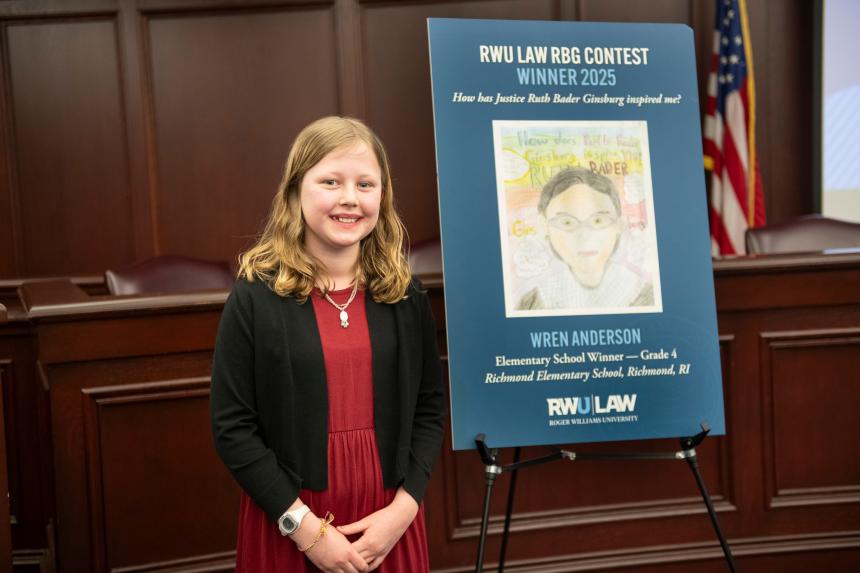
******
Middle School Winner (Grades 6-8)
"How Justice Ruth Bader Ginsberg Inspired Me"
Catherine Harley, Broad Rock Middle School, Grade 7
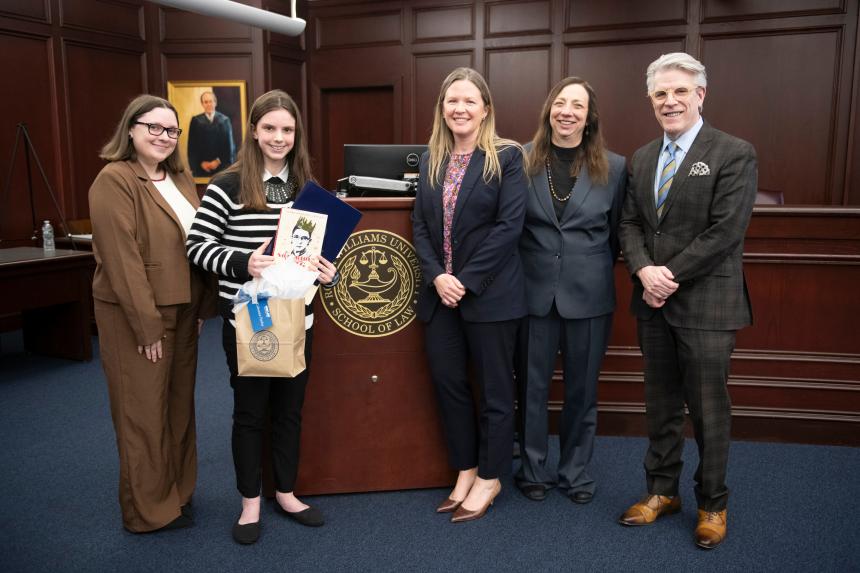
All my life I have heard the honorable judge’s name, Justice Ruth
Bader Ginsberg. My mom is a lawyer so it was a frequent topic at the
dinner table. I listened in awe over bowls of pasta at my mother’s
stories of the Justice’s life. How in college she went to all of her
husband's classes including her own and took notes for him while he
was sick. How even through the harsh sexism of society she just kept
going. As a young child and even now as a slightly older child, I have
always taken inspiration from the miraculous Justice.
These stories inspired me to learn about the law and the history
of the law. I decided to attempt to read the Constitution. I was inspired
to dive into my love of history. I asked my mom an uncountable
amount of questions about the law. I took economics books out of the
library to learn more about how the law of economics works and how
the law controls the economy. I was inspired to fight against sexism
and anyone who opposes me, to live up to her example.
After Justice Ginsberg’s death on September 8th, 2020, during
the pandemic, I felt a new fuel to invest myself even more in learning.
But also I was inspired by how hard Justice Ginsberg worked all her
life. Even after she became a member of the Supreme Court she
worked for what she thought was right no matter the setbacks and
obstacles along the way. We should all follow in her footsteps and
carry on the amazing legacy that she left behind. Justice Ruth Bader
Ginsberg is an inspiration to me and should be an inspiration for
everyone.
******
High School Winner (Grades 9-12)
"Everyone Can Learn From Ruth Bader Ginsburg"
Hazel Bradley, Mt. Hope High School, Grade 10
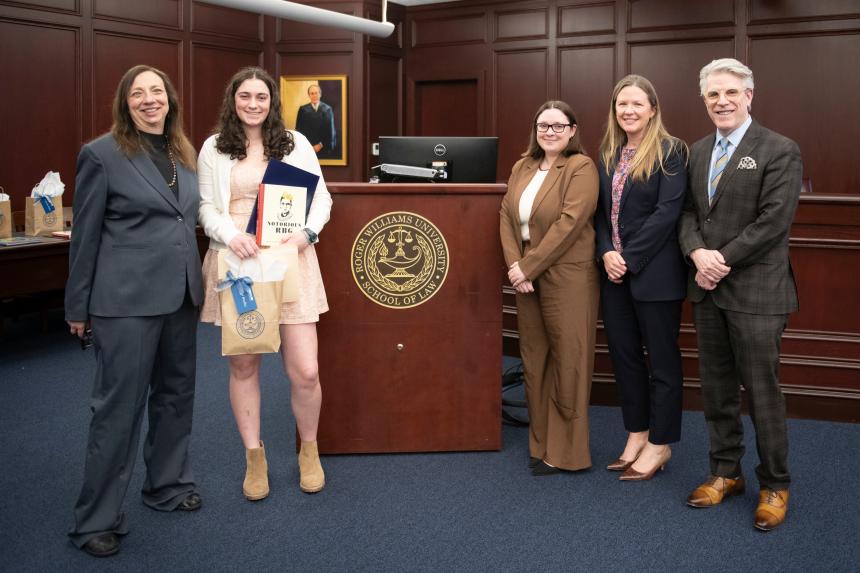
Throughout my childhood Ruth Bader Ginsburg was just a name I heard from adults every once and a while, and I thought to myself, what a long and confusing name to have, how does anyone remember what to call her? Now, I own a pair of socks with RBG’s face all over them, and I have a picture on my fridge of me dressed as RGB for Halloween in 8th grade. Well, I was actually a Ruth Bader Ginsburg fairy, because all of my friends were dressed as fairies and I wanted to be included so I tacked some fairy wings onto my supreme court justice robe.
Ever since I learned of Ginsburg’s quote “women belong in all places where decisions are being made,” a spark was lit inside of me, and I suddenly had a passion for feminism and living my life the way Ruth Bader Ginsburg would want me to, as a member of the next generation of powerful women in America.
Every day I try to prove to myself and others that I and other young women have the capability to be leaders like RBG. In a world where the media is everywhere we look, spreading heartbreaking stories and news of how our country is failing at things that have always been important not to fail at, it is hard to stay optimistic, and remember that it is all just a lowlight reel. RBG once said, “The true symbol of the United States is not the bald eagle. It is the pendulum. And when the pendulum swings too far in one direction, it will go back.” So, I try to remember that while there are bad things happening, there are also a lot of bright people ready to take action and turn things around for the better. Specifically, young women like me, full of opinions, and finding places to express those opinions to make positive change. Our generation isn’t doomed as some say, it’s just getting started, and soon the world will see how much we are capable of. If RBG believed in us, I think we should too. So, in the cracks of all of the bad things happening, flowers are poking through, more and more each day. And who is planting the seeds for those flowers and tending to them? Strong women. When Ruth Bader Ginsburg first started making change, growing flowers, there were a lot less women doing it with her. However, Ginsburg and other female leaders have paved the way for girls like me to live in a world where we can all grow flowers, and support each other despite some trying to stomp on the petals.
RBG also inspires me to be a peaceful activist. As she once said, “Fight for the things that you care about, but do it in a way that will lead others to join you.” This strategy of achieving positive change is what I think everyone should be keeping in mind going through their lives. When being an activist for a cause you care about, you can’t shut down the opposing side. You must show people who don’t agree with you why you think the way you do, in a peaceful light that won’t make them resent you and whoever you stand with. The only way to rise together is to respect each other enough to not label one another as good and bad. Ruth Bader Ginsburg brought respect with her everywhere she went, and she showed our beautiful country what success can come from lifting each other up instead of putting each other down. Collaborating instead of fighting. Respecting instead of insulting. Understanding instead of judging. Listening instead of dismissing. Sharing instead of forcing. Compromising instead of polarizing. Peacefully helping our country grow as one, not divided.
And so, Ruth Bader Ginsberg has inspired me, along with everyone else touched by her wisdom, strength, and compassion, to bring my young, female, and innovative mind to the table where decisions are being made, to make our community, country, and planet, a better place for everyone.
Elementary School Winner (Grades K-5)
"Equality for All People"
Visaagan Vipakaran, Woodridge Elementary School, Grade 5
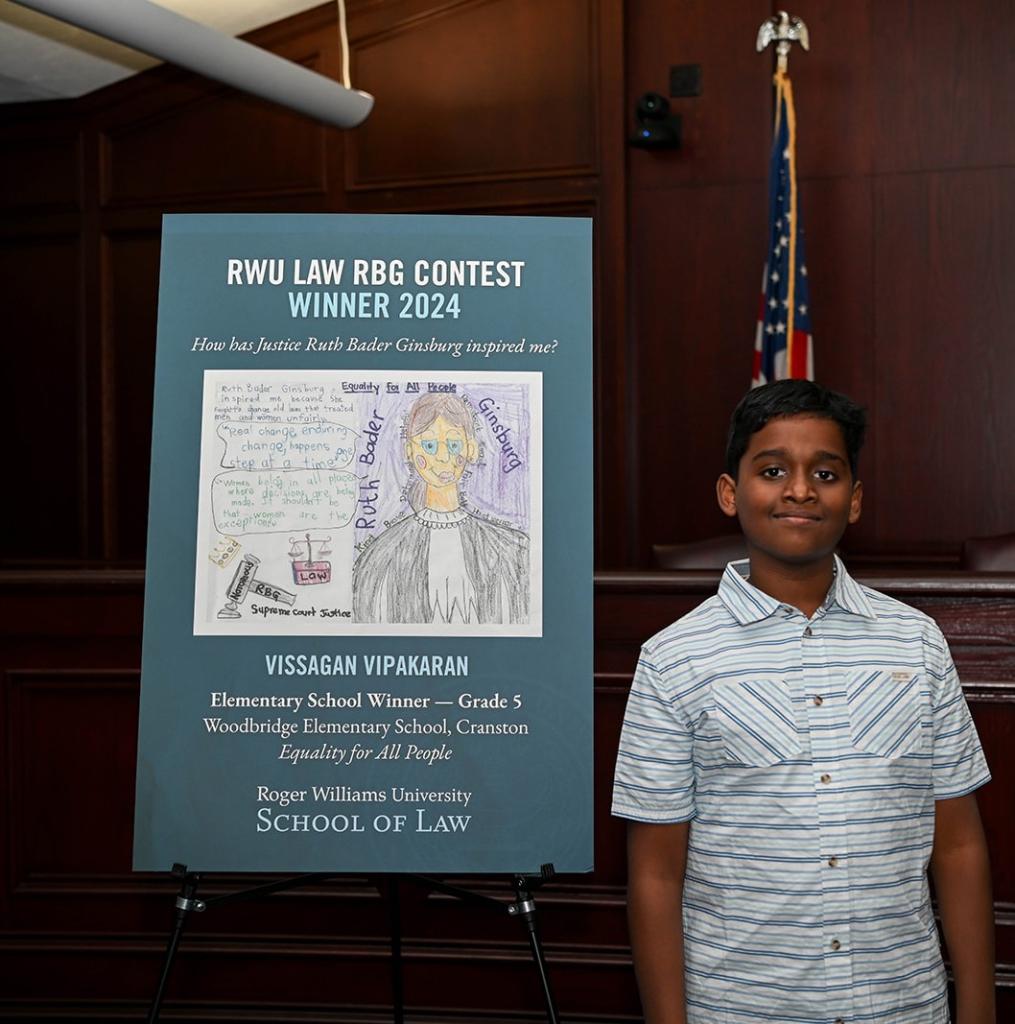
********
Middle School Winner (Grades 6-8)
"The Great Influence of Ruth Bader Ginsburg"
Reese Lourenco, Segue Institute for Learning, Grade 6
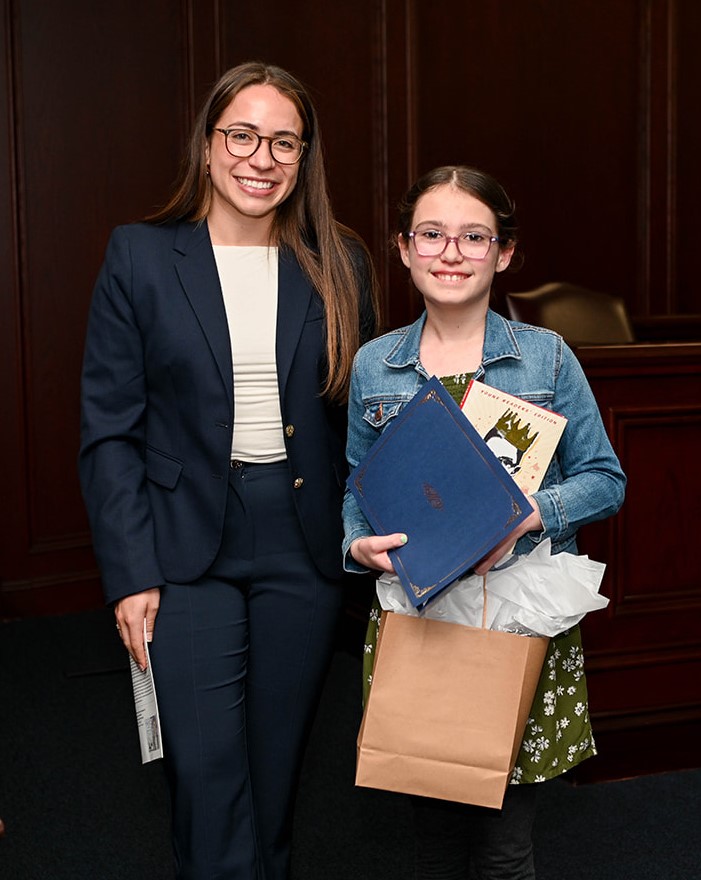
“Fight for the things you care about. But do it in a way that will lead others to join you.” That is the famous quote of a woman named Joan Ruth Bader Ginsburg, who was the first Jewish woman and the second woman to serve on the U.S. Supreme Court. Born March 15, 1933, she led the fight against gender discrimination and successfully argued six cases before the U.S. Supreme Court. Ruth Bader Ginsburg was a passionate woman who fought for equality and justice, and is remembered for her pathbreaking opinions on major issues, such as women’s rights, voting rights, and health care.
She believed that all people should have equal rights, but her work to achieve equal rights for women was the focus of her career. In a 1979 case, she challenged the notion that girls were less fit to serve on the jury. Ruth Bader Ginsburg explained in 2009, “Women belong in all places where decisions are being made”— including juries. “It shouldn't be that women are the exception.” She also championed these 5 laws to support gender equality; the Equal Pay Act, Title IX, the Pregnancy Discrimination Act, the Family and Medical Leave Act, and the Lilly Ledbetter Fair Pay Act. This inspired me because soon, at my school, I will be a 6th grade community leader, and the bravery Ruth Bader Ginsburg had as a leader is like an example for what I have to achieve as one. Community leaders are students who are selected to be the voice of the students and speak for the students and what they all as a collective believe in, and Ruth Bader Ginsburg has shown me what you need to be able to do in order to be successful in the role as a leader.
Another way she was an inspiration is the fact that even though she was sick with colon cancer, she kept working at the Supreme Court. Ruth Bader Ginsburg had her first experience with cancer in 1999 when the doctors discovered colon cancer at an early stage by accident because of an unrelated abdominal infection. 10 years later, when she was undergoing regular screenings, doctors discovered pancreatic cancer and removed part of her pancreas and her spleen. This is inspiring because although she was sick, she never stopped fighting for what she believed in and what she thought was better for the world. It tells me that even if something bad is going on in my life, I should still be true to my role as a community leader.
In conclusion, Ruth Bader Ginsburg has inspired me and the entire world with her bravery and perseverance. Although she’s not with us anymore, she will always be remembered for her accomplishments to make the world a better place. Ruth Bader Ginsburg is such an inspiration on people who will take over roles as types of leaders, including me taking on the role as community leader. To me, she is a symbol of hope and perseverance and just inspires me to keep pushing on.
********
High School Winner (Grades 9-12)
“The RBG Within ME”
Avery Blais, Mount Saint Charles Academy, Grade 9
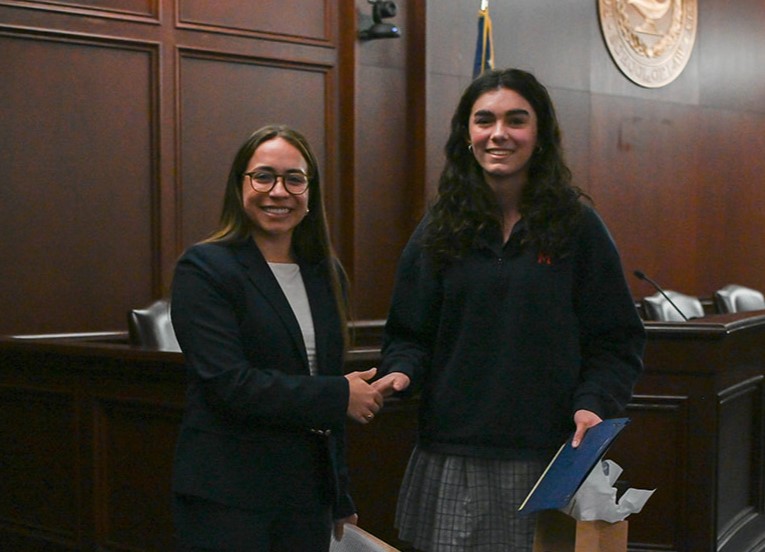
I stand on the starting line at the Track at New Balance, overwhelmed. A freshman girl, running against 12 varsity boys, preparing to run as hard as I can. Ruth Bader Ginsberg, the notorious RBG, probably felt a similar feeling to the one that I feel during this moment. A young woman, paired against people who were biologically stronger, but mentally my equal. It's overwhelming, maximally infuriating. She must have felt the nervous pressure weighing down on her chest, chasing impossible standards, but determined for an equal chance as every man had. How could a young Jewish teenager growing up in a close-minded 1940’s society, with twisted idealistic and unrealistic expectations on what it is to be a woman, become the renowned Justice we know of today? She grew through education, using it as a weapon in a male dominated profession, being one of the few women and top students in her 1954 Cornell class. She was able to rise above the scrutiny of a young woman abandoning the idea of a nuclear family for Harvard Law, and later Columbia, where she graduated first in her class. All this success without the support of her older sister and mother, whom she lost before graduating from high school.
Attorney Bader Ginsberg challenged the letter of the law, winning five major Supreme Court sex-discrimination cases when she was the Project Litigator for the ACLU. She impacted the world I live in, the rights I have, even before sitting on the Supreme Court. She allowed marginalized people to be spoken for, and was an advocate for equal rights. She knew how it felt to be looked down upon and expected less of, all because of the fact she had ovaries. Ruth Bader Ginsberg, the Columbia graduate, one of America's most renowned feminists, was once a 14-year-old girl. All this, because she had the will to chase the same chance afforded to men.
RBG once said, “When I’m sometimes asked when there will be enough (women judges on the US Supreme Court bench)”, I say, “When there are nine. People are shocked. But there’d be nine men, and nobody’s ever raised a question about that.” She was once me. To me, RBG is a goal. She is an inspiration, and a hero who paved the way for the next generation of Americans. No matter the gender or race, everyone shares a responsibility to protect the constitution and the rights reflected in it. My feet lift off the track, and I begin. Failure was not an option for her, it's not an option for me either.
Elementary School Winner
“Ruth Bader Ginsburg”
By Samantha Cabrera & Reshmi Unruh, Edward S. Rhodes Elementary School – Cranston (Grade 4)
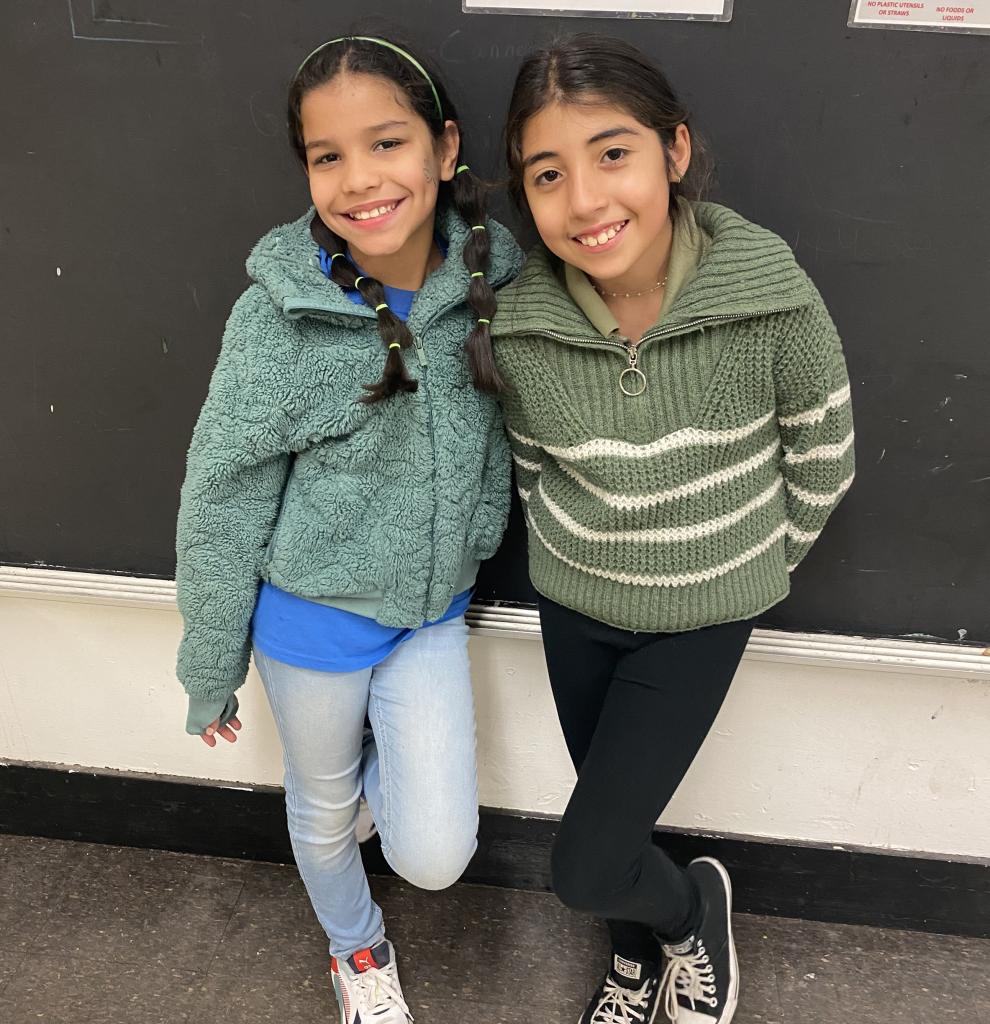
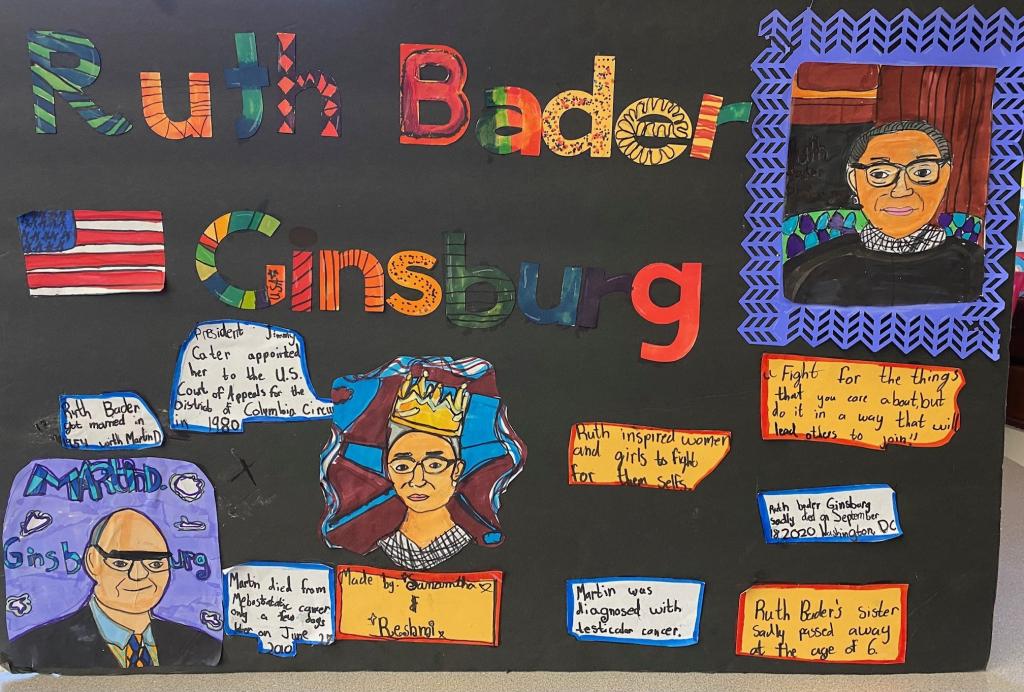
* * * * * * * * * *
Middle School Winner
“A Hero's Life”
By Mairead Lapierre, Lawn Avenue School – Jamestown (Grade 7)
 My grandma, Napa, is my hero. Growing up in the 1960's, Napa loved science, but was told she couldn't become a scientist because that wasn't a career option for girls. Napa was told if she went to college she had to become a nurse or a teacher because those were jobs appropriate for women to do outside of the house. So, Napa became a nurse because it gave her a chance to study science, which she loved.
My grandma, Napa, is my hero. Growing up in the 1960's, Napa loved science, but was told she couldn't become a scientist because that wasn't a career option for girls. Napa was told if she went to college she had to become a nurse or a teacher because those were jobs appropriate for women to do outside of the house. So, Napa became a nurse because it gave her a chance to study science, which she loved.
While Napa was limited because she was a girl, Ruth Bader Ginsberg was fighting to get rid of those limitations for girls. In her life, Ginsburg faced many situations where she was limited because of her gender. For example, no law firm wanted to hire her because she was a woman. In one of Ginsburg's cases, Reed vs. Reed, she fought because a man was being preferred over a woman based on nothing but his sex. Ginsburg argued that women were being discriminated against in the 14th amendment, which says if you were born in the U.S.A or are a citizen, you have equal protection under the laws.
Unlike Napa and Ginsburg, I'm growing up at a time where women are allowed to choose a career they're interested in. Women have less restrictions on what they can and can't study today. Also, women have the agency to pursue opportunities that Ginsburg fought for. Ginsburg has inspired my life in many ways; one of those ways is by fighting for women to have the rights to do things that they couldn't. There are so many more opportunities for me today than there were when Napa was growing up.
Many of those opportunities exist because of women like Ginsburg.
* * * * * * * * * *
High School Winner
“Steps Toward Equality”
By

Ruth Bader Ginsburg lived a life of unrelenting excellence in the face of hardship. She was a machine, with an almost perfect academic record that she carried into a highly successful career, but she was a human, persevering against the odds, fueled by a passion for equality and women's rights. She was strong in the face of blatant sexism, and fought her way through a hostile educational system while remaining at the top of her class. She was the embodiment of what the Supreme Court represents - justice. However, what characterized her career was not her idealism but her effectiveness. We take some of her successes for granted today, but even her incremental achievements worked to dismantle the foundational elements of legal discrimination.
Her fight for equality was powered by skill and strategy. In her lead opinion in U.S. v. Virginia, she argued that the Virginia Military Institute's policy of not admitting women was unconstitutional. Through this case and others, she made decisive gains for women's rights. But the fight for equality was broader than this. As a litigator, she won cases like Weinberger v. Wiesenfeld, arguing against denial of social security benefits for widowers on the basis of gender. Her consistency in her arguments won her favor with men as well as women and steeled her arguments against opponents who would claim she was biased. She believed in equality regardless of gender, and that's what she fought for. Instances like these where the law explicitly targeted one gender were an easier target to dismantle because they were so blatantly harmful and discriminatory. Though she would have been justified in pushing for immediate and total equality for women, Ginsburg had an eye on what was effective and made many smaller steps towards equality. Her measured but persistent attitude is something to learn from in today's political environment. Through finding points of agreement with even those who are radically opposed, we can maintain both progress and stability.
Though Ginsburg has passed, her legacy has become especially relevant with the fall of Roe v. Wade. She was always a firm advocate for a woman's right to choose her own life's course. On this issue she again took a practical approach, grounded in the reality of women's lives rather than metaphysical debates about when "life" begins. She defended Roe v. Wade, and stood against the erosion of women's autonomy in her Gonzales v. Carhart dissent. She emphasized the drastic impact of having a child, from the health risks of childbirth to the long-term impact on a woman's career, economic prospects, and freedom. She brought the issue down from unproductive theoretical debates to the real issues faced by real women. I was in Washington D.C. when Roe v. Wade was overturned, and I watched the early protests form.
Seeing the pain and desperation of the protestors reaffirmed what Ruth Bader Ginsburg had argued: at the heart of the abortion issue is a woman's right to health care and autonomy. By that point, Ginsburg was no longer on the court, but her spirit lived on in the many protestors that fought to preserve her ideals. We must pick up the torch and fulfill her legacy, protecting the abortion rights that remain and reinstating equality for all.
BRISTOL, R.I., March 22, 2022 – Roger Williams University School of Law is proud to announce the winning entries in its Second Annual Ruth Bader Ginsburg Essay Contest.
In December, RWU Law invited Ocean State students from grades K through 12 to submit essays and artworks on how they have been inspired by the legacy of late Associate Justice of the Supreme Court of the United States, who passed away on September 18, 2020.
As part of the prize, Rhode Island Lawyers Weekly generously agreed to publish the winning entries. The winning students also received cash prizes and books.
“Justice Ginsburg cared about equality for all people,” said RWU Law Professor Emily Sack, who advises the Women’s Law Society, which co-sponsored the contest with its members serving as judges. “When she started her fight for women’s equality under the law, it seemed like an impossible task, but she worked hard and persisted, and made great strides for the things she believed in.
“She also knew that this is not something she could accomplish alone, and that we all have a part to play in making a better world,” Sack added. “She famously said, ‘Fight for things you care about, but do it in a way that will lead others to join you.’” This essay contest ia a wonderful way for all of us, and especially our state’s students, to be inspired by Justice Ginsburg’s life and her call to action.”
This year’s response was once again gratifyingly large and enthusiastic, and the judges found themselves making some very hard choices. But the winners have been selected and (drum roll) they are:
Elementary School Winner
“Justice, Justice, Shall You Pursue”
By Aviva Nierman,North Smithfield Elementary School (Grade 3)

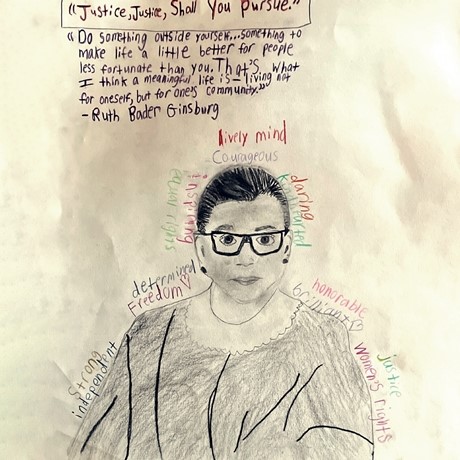
* * * * * * * * * *
Middle School Winner
“How Has Ruth Bader Ginsburg Inspired Me?”
By Carter Mi, TIMES² Academy, Providence (Grade 6)

Ruth Bader Ginsburg has inspired the world in many different ways, especially for women. But here is how she has personally inspired me. The first way is that she was one of only nine women in her class of 500 hundred at Harvard Law School. She even graduated at the top of her class! How this inspires me is that when I grow older I want to become a lawyer. At the time being a lawyer was a rare job for women since they were thought to be less intelligent or less capable than men. This fact makes it more inspiring because she defied the expectations of society at that time.
In addition to that statement, another way she has inspired me is that she did many things for women’s rights. How this inspires me is that women at the time were oppressed. Even though I am not a woman, I feel inspired by this because I am an Asian-American and quite a few Asian hate crimes occur throughout America due to the spread of COVID-19. People of my culture are currently being oppressed, kind of like how women were at the time, so seeing someone stand up for their people in order to prove what they think is right truly inspires me.
Lastly, the final way she has inspired me is that she kept working at the Supreme Court even though she was sick with colon cancer. How this inspires me is that throughout my life I’ve experienced a few deaths and have seen loved ones struggle to stay alive while they were sick. Now, to see someone who has the strength and willpower to work even though they’re sick with a disease like cancer is truly inspirational.
In conclusion, Ruth Bader Ginsburg is an inspirational figure, not just for women, but the entire world as a whole. Even though she’s gone now, she will not be forgotten for the ways she has inspired the world.
* * * * * * * * * *
High School Winner
“Cultivating Change”
By Isabella Montini, North Kingstown High School (Grade 12)

Ruth Bader Ginsburg not only paved the way for feminists, but she demonstrated what true leadership looks like. Throughout her career she worked with others and led a nation to fight for what they believed in and to encourage others to join them, no matter their beliefs.
She practiced what she preached through the friendship she found with Justice Scalia. Although the two Justices had differing ideologies, they battled in good faith and had a lasting friendship. Her actions and words have inspired me because not only did she fight for justice, but she fought for civility among differing opinions.
This is a key value that I impose as I lead a non-partisan political action committee called Students4Change. Giving students and young members of society a voice in local democracy is a powerful skill to cultivate meaningful change. Ruth Bader Ginsburg inspired me to lead this platform to give everyone a collective voice, no matter their viewpoint.
Our country is lacking good-faith actors on the local, state, and national level. Citizens can become cruel and vile when fighting for what they stand for, as demonstrated during the insurrection. RBG never gave in to foul play or bad actors. She chose to lead in a way in which others will follow. Her passion and leadership inspired me to fight for what I believe in during local municipal meetings, as well as encouraging others to do so despite controversy in opinions.
Ruth Bader Ginsburg was also an avid fighter for voting rights and wanted to grant equitable access for Americans to exercise this right. In the case of Shelby County v. Holder, RBG specified that she believed any states with a history of racial discrimination in voting under The Voting Rights Act of 1965 should be required to get federal approval before changing their voting laws.
Because of the history across the country of gerrymandering, limiting ballot drop boxes, and stigmas around mail-in ballots, RBG’s fight for equitable voting rights inspired me to join the Let Rhode Island Vote campaign and work with elected officials to ensure voting rights in Rhode Island. These provisions include no excuse mail voting, a permanent absentee list, rigorous voter registration list maintenance, early voting, enhanced signature verification, online mail ballot request, ballot drop boxes, no witness requirement, and new primary dates.
I door-knocked in Providence to inform citizens on this new act, and encourage them to send Let Rhode Island Vote postcards to their state senators and representatives. My political action committee also met with Alana DiMario, one of the lead state senators sponsoring the legislation, to discuss how efforts can be increased to ensure its passing. As RBG put it, “throwing out preclearance, when it has worked and is continuing to work to stop discriminatory changes, is like throwing away your umbrella in a rainstorm because you are not getting wet.”
As a feminist, Ruth Bader Ginsburg continuously stood up for women’s rights and equal representation. She gave us a seat at the table and showed so many that the voices of women need to be heard and respected. Her perseverance has inspired me to fight for equitable access to abortion in Rhode Island. Under the current system, not all healthcare covers this cost. This disproportionately affects women of color and women with lower incomes. We all deserve equitable access to these programs.
Throughout her career, Ruth Bader Ginsburg has worked to protect the rights of so many Americans. Her actions and words of wisdom inspired me to fight for what I believe in in my own town and state. She leaves behind a great legacy of leading in a way where others will follow, and she proved that what makes a great leader is inspiring others to also fight for change as she laid the groundwork for so many after her.
BRISTOL, R.I., March 3, 2021 – Last December, Roger Williams University School of Law invited Ocean State students from grades K through 12 to submit essays and artworks on how they have been inspired by the legacy of late Associate Justice Ruth Bader Ginsburg of the Supreme Court of the United States, who passed away on September 18, 2020.
As part of the prize, Rhode Island Lawyers Weekly agreed to publish the winning entries. The winning students also received cash prizes and books.
“Justice Ginsburg cared about equality for all people,” said RWU Law Professor Emily Sack, who advises the Women’s Law Society, which co-sponsored the contest, with its members serving as judges. “When she started her fight for women’s equality under the law, it seemed like an impossible task, but she worked hard and persisted, and made great strides for the things she believed in.
“She also knew that this is not something she could accomplish alone, and that we all have a part to play in making a better world,” Sack added. “She famously said, ‘Fight for things you care about, but do it in a way that will lead others to join you.’ We thought this essay contest would be a wonderful way for all of us, and especially our state’s students, to be inspired by Justice Ginsburg’s life and her call to action.”
The response was gratifyingly large and enthusiastic, and the judges found themselves making some very hard choices. But the winners have been selected and (drum roll) they are:
* * * * *
Breaking Glass Ceilings
By Millin Licht, Jewish Community Day School, Providence
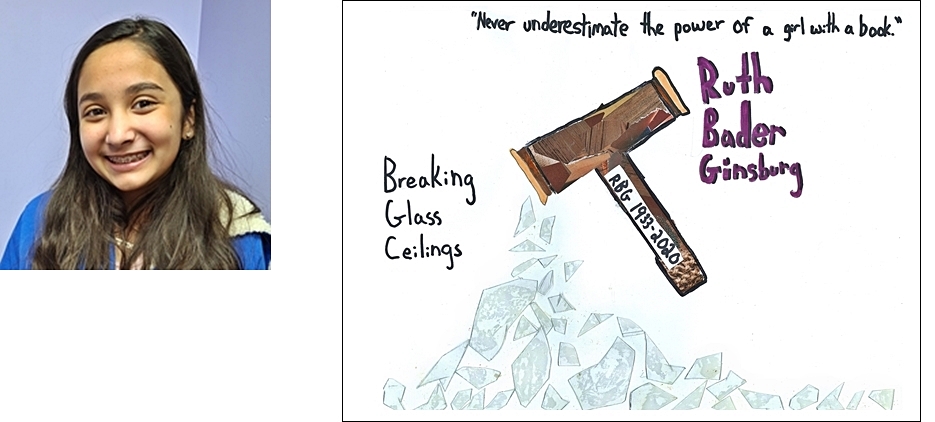
* * * * *
Jackpot and Ruth Bader Ginsburg
By Mairead Lapierre, Lawn School, Jamestown
 Supreme Court Justice Ruth Bader Ginsburg once said, “Fight for the things that you care about but do it in a way that will lead others to join you.” RBG has inspired me in my life to fight for the things I care about.
Supreme Court Justice Ruth Bader Ginsburg once said, “Fight for the things that you care about but do it in a way that will lead others to join you.” RBG has inspired me in my life to fight for the things I care about.
RBG inspired me by not being afraid to work with almost all men. The first time I saw the boys playing Jackpot at recess, I thought “that looks fun.” There were seven boys throwing and catching a football and yelling out numbers and different sayings, like “Pac Man” and “Mystery Box,” as they were throwing the ball. There were no other girls playing with them. I was really bothered, because while the boys were playing Jackpot, all the girls were playing Four Square.
I went over to the boys and asked if I could play Jackpot with them, because it looked like fun and I wanted to try playing something new. The boys said that I had to be able to throw and catch a football. I remember getting ready to throw the football and all the boys moved up close to me –clearly thinking I wouldn’t be able to throw the ball far. I threw the football in a spiral just like my Dad taught me and it went over their heads. Steve turned to Liam and said, “She throws better than you!” My throw impressed them enough, and they let me join the game. Once the other girls saw me playing, a few of them came over and asked if they could play, too. Steve asked them, “Can you throw the ball?” And I said, “Just let them play!” And the boys let them play.
RBG has inspired me in my life to help adjust things that are not equal. She inspired me to play games with boys, and that got some girls to join so that it wasn’t just boys playing with boys and girls playing with girls.
* * * * *
A Seat at the Table
By Jasmine Stevens, St. Mary Academy - Bay View, East Providence
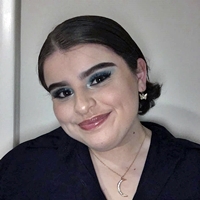 Ruth Bader Ginsburg was the epitome of a visionary. She knew what the world could be, and she sought to ensure that her vision became reality. Ginsburg was undeniably a mastermind, her levels of valor and genius were truly unmatched. And even though she grew up in a world where she was told to be quiet and proper by the society around her, she never let that affect her goals and ambitions.
Ruth Bader Ginsburg was the epitome of a visionary. She knew what the world could be, and she sought to ensure that her vision became reality. Ginsburg was undeniably a mastermind, her levels of valor and genius were truly unmatched. And even though she grew up in a world where she was told to be quiet and proper by the society around her, she never let that affect her goals and ambitions.
Ginsburg’s mind worked like clockwork: everything had a place and, if all parts were moving together and correctly, the clock would tick in harmony. She held herself with a silent confidence: she had nothing to prove, no need to justify herself or her actions, no second guessing, just her self-assurance keeping her going. I aspire to acquire the level of confidence she held, and use her as the visualization of what that would look like.
Ginsburg accomplished so much throughout her career. She adjusted with the times and, most of all, she was an excellent listener. She had the ability to empathize with those around her; the ability to see things from a third person’s perspective. She was able to step back and view things from the perspective of those she was listening to, and to understand the disproportionate ways in which individual policies affected certain marginalized groups. Ginsburg seemed to hold all the qualities of an empath, in ways that make me want to see the world in the way she saw it. Her actions have made me strive to be more understanding and compassionate, to think of others and not only myself.
I cannot even fathom into words the level of genius which she possessed. The execution of her argued Supreme Court cases were unbelievably and undeniably brilliant. When I first listened to her court hearings, I was confused at first. I struggled to understand why she was so keen on finding male gender bias victims. It was upon hearing and reading the Califano v. Goldfarb case that it all clicked. Ginsburg got the judges to unknowingly admit the existence of gender bias, an institution they refused to admit exists. Instead of attempting to discuss gender bias against women, where it was strongest, to non-listening ears, she thought to establish it first against men: genius.
Ginsburg understood that people, especially men, did not believe in gender bias, especially against women. Instead of trying to explain that gender bias against women existed, a topic that was and is still currently being forced into silence, she established gender bias against men. In establishing that gender bias against men existed, she established that the fundamental idea and policy of gender bias does in fact exist. And in establishing its overall existence, she established that gender bias against women exists as well. It never ceases to amaze me to look back on Ginsburg’s accomplishments. This case specifically taught me that when people won’t listen to what you have to say, you must make them listen. It taught me that tactical skill and execution are just as important as the facts in front of you, and that confidence in the information you are relaying is so utterly important.
Ruth Bader Ginsburg taught me to not apologize for existing in a world where the odds are stacked against me, to question outdated and biased authority, and make the world a place I can openly and happily exist in. Not only was Ginsburg a women’s rights activist, but she was also an LGBTQ+ ally. She fought against racial injustice, and sought to abolish classist infrastructures within this country. Ginsburg taught me to be confident in who I am, and to fight for what I believe in. She told me and many other girls my age and those older, that we deserve our seat at the table.
While we may have to fight for it more than our male counterparts, we are every bit as deserving as those who have been handed a seat, if not more. Ginsburg earned all that she had. She paved her own path, made her own way in this world, and that is exactly what I intend to do. This past year of 2020 has taught me to be myself even if society will not accept me for it. And with Justice Ginsburg’s guidance throughout my adolescence, I feel as though I’m finally owning my identity.
Elementary School Winner (Grades K-5)
Wren Anderson
Richmond Elementary School, Grade 4
How has Justice Ruth Bader Ginsburg inspired me?
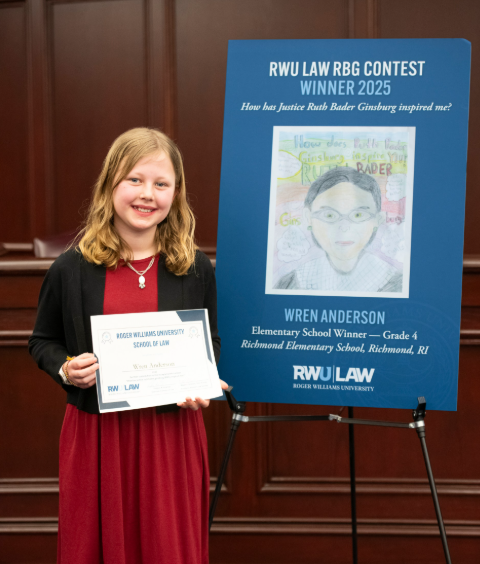
Middle School (Grades 6-8)
Catherine Harley
Broad Rock Middle School, Grade 7
How Justice Ruth Bader Ginsberg Inspired Me
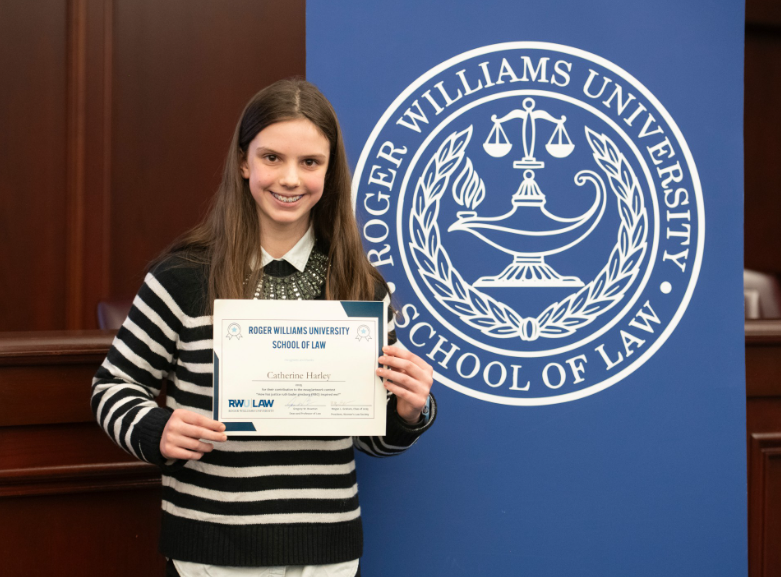
"All my life I have heard the honorable judge’s name, Justice Ruth Bader Ginsberg. My mom is a lawyer so it was a frequent topic at the dinner table. I listened in awe over bowls of pasta at my mother’s stories of the Justice’s life. How in college she went to all of her husband's classes including her own and took notes for him while he was sick. How even through the harsh sexism of society she just kept going. As a young child and even now as a slightly older child, I have always taken inspiration from the miraculous Justice.
These stories inspired me to learn about the law and the history of the law. I decided to attempt to read the Constitution. I was inspired to dive into my love of history. I asked my mom an uncountable amount of questions about the law. I took economics books out of the library to learn more about how the law of economics works and how the law controls the economy. I was inspired to fight against sexism and anyone who opposes me, to live up to her example.
After Justice Ginsberg’s death on September 8th, 2020, during the pandemic, I felt a new fuel to invest myself even more in learning. But also I was inspired by how hard Justice Ginsberg worked all her life. Even after she became a member of the Supreme Court she worked for what she thought was right no matter the setbacks and obstacles along the way. We should all follow in her footsteps and carry on the amazing legacy that she left behind. Justice Ruth Bader Ginsberg is an inspiration to me and should be an inspiration for everyone."
High School (Grades 9-12)
Hazel Bradley
Mt. Hope High School, Grade 10
Everyone Can Learn From Ruth Bader Ginsburg
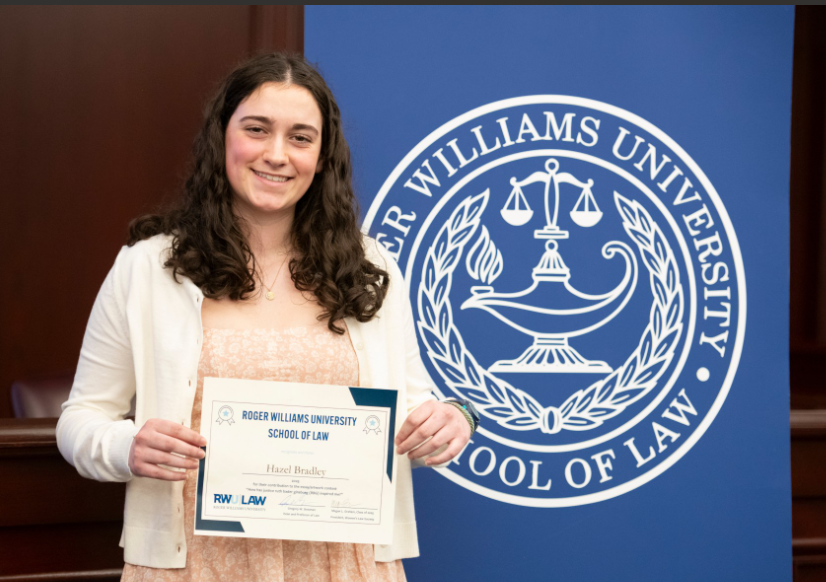
"Throughout my childhood Ruth Bader Ginsburg was just a name I heard from adults every once and a while, and I thought to myself, what a long and confusing name to have, how does anyone remember what to call her? Now, I own a pair of socks with RBG’s face all over them, and I have a picture on my fridge of me dressed as RGB for Halloween in 8th grade. Well, I was actually a Ruth Bader Ginsburg fairy, because all of my friends were dressed as fairies and I wanted to be included so I tacked some fairy wings onto my supreme court justice robe.
Ever since I learned of Ginsburg’s quote “women belong in all places where decisions are being made,” a spark was lit inside of me, and I suddenly had a passion for feminism and living my life the way Ruth Bader Ginsburg would want me to, as a member of the next generation of powerful women in America.
Every day I try to prove to myself and others that I and other young women have the capability to be leaders like RBG. In a world where the media is everywhere we look, spreading heartbreaking stories and news of how our country is failing at things that have always been important not to fail at, it is hard to stay optimistic, and remember that it is all just a lowlight reel. RBG once said, “The true symbol of the United States is not the bald eagle. It is the pendulum. And when the pendulum swings too far in one direction, it will go back.” So, I try to remember that while there are bad things happening, there are also a lot of bright people ready to take action and turn things around for the better. Specifically, young women like me, full of opinions, and finding places to express those opinions to make positive change. Our generation isn’t doomed as some say, it’s just getting started, and soon the world will see how much we are capable of. If RBG believed in us, I think we should too. So, in the cracks of all of the bad things happening, flowers are poking through, more and more each day. And who is planting the seeds for those flowers and tending to them? Strong women. When Ruth Bader Ginsburg first started making change, growing flowers, there were a lot less women doing it with her. However, Ginsburg and other female leaders have paved the way for girls like me to live in a world where we can all grow flowers, and support each other despite some trying to stomp on the petals.
RBG also inspires me to be a peaceful activist. As she once said, “Fight for the things that you care about, but do it in a way that will lead others to join you.” This strategy of achieving positive change is what I think everyone should be keeping in mind going through their lives. When being an activist for a cause you care about, you can’t shut down the opposing side. You must show people who don’t agree with you why you think the way you do, in a peaceful light that won’t make them resent you and whoever you stand with. The only way to rise together is to respect each other enough to not label one another as good and bad. Ruth Bader Ginsburg brought respect with her everywhere she went, and she showed our beautiful country what success can come from lifting each other up instead of putting each other down. Collaborating instead of fighting. Respecting instead of insulting. Understanding instead of judging. Listening instead of dismissing. Sharing instead of forcing. Compromising instead of polarizing. Peacefully helping our country grow as one, not divided.
And so, Ruth Bader Ginsberg has inspired me, along with everyone else touched by her wisdom, strength, and compassion, to bring my young, female, and innovative mind to the table where decisions are being made, to make our community, country, and planet, a better place for everyone."

